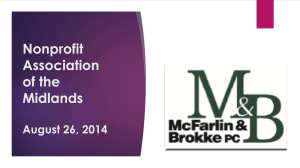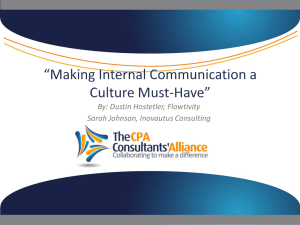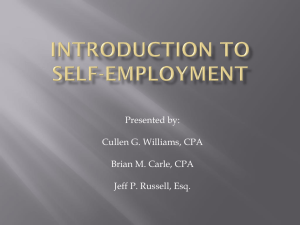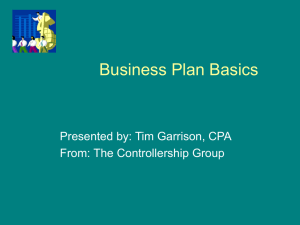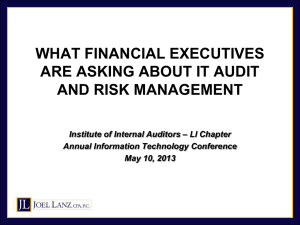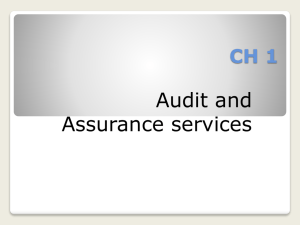Independent Audit/Review Requirements
advertisement
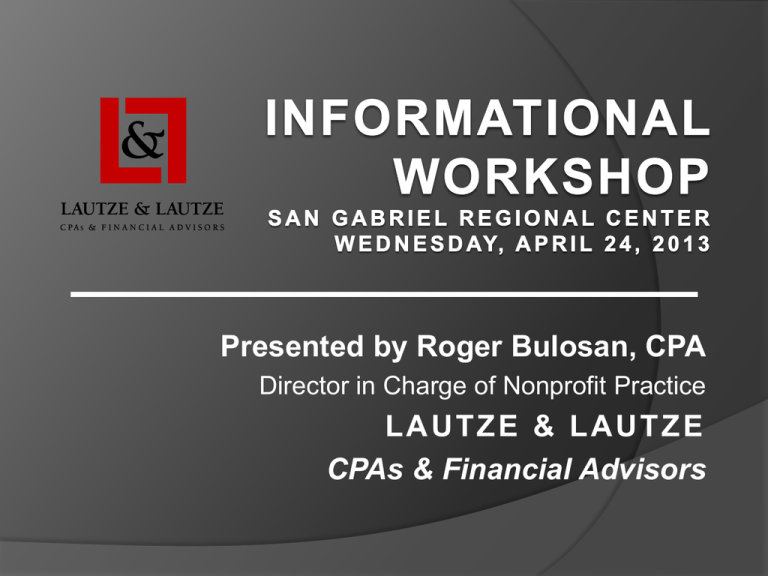
Presented by Roger Bulosan, CPA Director in Charge of Nonprofit Practice LAUTZE & LAUTZE CPAs & Financial Advisors SB 74, Committee on Budget and Fiscal Review Developmental Disabilities Services Amends Welfare and Institutions Code §4652.5 Effective March 24, 2011 WHY WAS THIS LAW IMPLEMENTED? To provide more uniformity and consistency in the administrative practices and services of Regional Centers throughout the State To develop best practices for Regional Center management internally and for monitoring purchase of services expenses WHAT DOES IT MEAN TO VENDORS? Vendors will be required to obtain either an independent review or independent audit of their financial statements by a CPA This law has a lower audit threshold for California nonprofits set at $2 million SB 1262 WHO DOES THIS AFFECT? Vendors receiving payments from one or more Regional Centers equal to or more than $250,000 but less than $500,000 during a financial year are required to obtain an independent review or audit of their financial statements in accordance with U.S. generally accepted accounting principles - §4652.5(A) WHO DOES THIS AFFECT? Vendors receiving payments from one or more Regional Centers equal to or more than $500,000 during a financial year are required to obtain an independent audit of their financial statements in accordance with U.S. generally accepted accounting principles – §4652.5(B) WHO DOES THIS AFFECT? All Work Activity Program (WAP) providers regardless of payment amount received from the Regional Center – Work Activity Program services through the Department of Rehabilitation include paid work, work adjustment and supportive rehabilitation services in a sheltered work shop setting – §4652.5(A) THIS LAW DOES NOT APPLY TO: Payments made using usual and customary rates, as defined by Title 17 of the California Code of Regulations §4652.5(B)(2) State and local governmental agencies, the University of California or the California State University - §4652.5(B)(3) 15% ADMINISTRATIVE CAP Regional center contracts or agreements with service providers in which rates are determined through negotiations between the Regional Center and the service provider expressly require that not more than 15% of Regional Center funds be spent on administrative costs – SB 74 15% ADMINISTRATIVE CAP Direct service expenditures are those costs immediately associated with the services to consumers being offered by the provider Administrative expenses service expenditures are not direct 15% ADMINISTRATIVE CAP Administrative costs include: Salaries, wages, employee benefits for managerial personnel whose primary purpose is administrative management Salaries, wages, employee benefits of employees who perform administrative functions Facility and occupancy costs, directly associated with administration Maintenance and repair 15% ADMINISTRATIVE CAP Administrative costs include: Data processing and computer support services Contract and procurement activities Training directly associated with administrative functions Travel directly associated with administrative functions Licenses directly associated with administrative functions Taxes WHEN IS THIS LAW EFFECTIVE? “For all entities, whether they already obtained an audit/review or whether this is the first audit/review, the requirement applies to the entity’s fiscal year at the time of the statute’s enactment” – Source: Letter dated September 16, 2011 from Department of Developmental Services Vendors with a July through June fiscal year, the requirement would apply to the audit/review performed of the July 1, 2010 to June 30, 2011 financial statements WHEN IS THIS LAW EFFECTIVE? Vendors with a January through December calendar year, the requirement would apply to the audit/review performed of the January 1, 2011 to December 31, 2011 financial statements Department of Developmental Services recommends that vendors schedule their audit/review as soon as possible INDEPENDENT REVIEW VS. INDEPENDENT AUDIT WHAT CAN A VENDOR EXPECT DURING AN INDEPENDENT REVIEW OF FINANCIAL STATEMENTS? The goal is for the CPA to provide negative assurance that the CPA is “… not aware of any material modifications that should be made to the accompanying financial statements in order for them to be in conformity with accounting principles generally accepted in the United States of America.” INDEPENDENT REVIEW The CPA performing the review will ask the vendor about their accounting practices and methods Accrual basis Inventory methods Bad debt estimates INDEPENDENT REVIEW The CPA will ask the vendor their procedures for recording, classifying and summarizing accounting transactions Procedures for revenue recognition Purchasing Asset classification INDEPENDENT REVIEW The CPA will review the vendor’s financial statements and identify items that appear unusual Unexplained account variations Account balances that do not equal supporting schedules or reconciliations Account balances that contradict known facts INDEPENDENT REVIEW The CPA will perform analytical procedures Ask about current and prior year’s financial statements variations Ask about current year’s budget vs. actual variances Calculate ratio analysis Compare your results to industry trends/standards INDEPENDENT REVIEW The CPA will ask the vendor if there have been any Board of Directors meetings related to Significant decisions Lawsuits Budgetary actions and what those actions were WHAT CAN A VENDOR EXPECT DURING AN INDEPENDENT AUDIT OF FINANCIAL STATEMENTS? The goal is for the CPA to express an opinion “… that the financial statements are presented fairly, in all material respects in conformity with accounting principles generally accepted in the United States of America.” INDEPENDENT AUDIT As part of the audit, the CPA will inspect documents and send confirmations Bank and investment balances Vendor’s accounts receivable balances Debt with third parties Legal matters with attorneys INDEPENDENT AUDIT The CPA will review and gain understanding of your internal controls an Gain an understanding of the effectiveness and efficiency Gain an understanding of segregation of duties Reliability of financial reporting Compliance with laws and regulations INDEPENDENT AUDIT The CPA will evaluate the risk of financial statement fraud, misappropriation of assets, and material errors Identify scenarios in which theft or loss could occur May investigate issues that arise INDEPENDENT AUDIT Initial Audits The CPA will need to perform additional work to determine that the beginning account balances (7/1/10 or 1/1/11) not just 6/30/11 or 12/31/11 balances are fairly stated Can not get an unqualified opinion on activity statements without testing beginning balances TYPES OF AUDITOR OPINIONS AND WHICH ONE YOU WANT Unqualified – states that in the CPA’s judgment that the vendor’s financial statements are fairly stated in all material respects Have all required disclosures and proper accounting policies No scope limitations This is the one you want! TYPES OF AUDITOR OPINIONS Qualified – states that in the CPA’s opinion that the financial statements are not fairly stated or is limited in scope in some way TYPES OF AUDITOR OPINIONS Adverse – states that the vendor’s financial statements are misrepresented, misstated, and do not accurately reflect its financial position, results of operations, and cash flows Disclaimer – states that an audit opinion cannot be rendered because the limitations are so great that they can not be overcome by alternative procedures MANAGEMENT LETTERS This is the CPAs requirement to report internal control weaknesses to those in charge of governance Material weaknesses Significant deficiencies Constructive comments—do not involve internal control REQUIREMENTS FOR BOTH THE INDEPENDENT REVIEW AND INDEPENDENT AUDIT The vendor is required to provide copies of the independent review report or independent audit report and accompanying management letter to the vendoring Regional Center within 30 days of the completion of the review or audit – §4652.5(B)(3)(b) REQUIREMENTS FOR BOTH THE INDEPENDENT REVIEW AND INDEPENDENT AUDIT Regional Centers receiving the review report or audit report will review the report and require resolution for issues, if any, identified in the report that have a direct or indirect impact on Regional Center services – Regional Centers will take appropriate action, including termination of the vendor relationship for lack of resolution of issues – §4652.5(B)(3)(c) REQUIREMENTS FOR BOTH THE INDEPENDENT REVIEW AND INDEPENDENT AUDIT Regional Centers will notify DDS of all qualified, adverse, and disclaimer opinion reports or reports noting significant issues that directly or indirectly impact Regional Center services – §4652.5(B)(3)(d) THE BASIC FINANCIAL STATEMENTS Balance Sheet or Statement of Financial Position – summarizes an entity’s assets, liabilities, and shareholders’ equity or net assets at a specific point in time, typically the end of the fiscal year THE BASIC FINANCIAL STATEMENTS Income Statement or Statement of Activities – measures an entity’s operating performance over a period of time, typically for the fiscal year THE BASIC FINANCIAL STATEMENTS Cash Flow Statement – discloses operating, financing, and investing cash flow activities over a period of time, typically for the fiscal year Statement of Functional Expenses – reports expenses by their function (programs, management and general, fundraising) and by the natural expense (salaries, rent) over a period of time, typically for the fiscal year TIPS TO HELP YOU CHOOSE A CPA FIRM Education – Check out the firm’s credentials and look for additional specialized skills that will benefit you—audit, tax, business consulting Professional Organizations – Make sure the firm is a member of American Institute of CPA’s and California Society of CPA’s Peer Review – This is a CPA firm auditing a CPA firm. Choose a firm that undergoes a peer review. Peer reviews maintain standards, improve performance and provide credibility TIPS TO HELP YOU CHOOSE A CPA FIRM Send out Requests for Proposals (RFPs) List the qualifications you are looking for Consider the timing of when the audit or review will be performed—if you move the work to slower periods, usually will be done for less cost Consider the size of the firm—usually the larger the firm, the more expensive. Smaller firms usually lack the expertise to help you with other management issues Make sure CPA has satisfied, similar sized clients TIPS TO HELP YOU CHOOSE A CPA FIRM The CPA should: Excel at serving people Be honest with a high level of integrity Be well-experienced in the areas that you need Be a good communicator, both listening and speaking TIPS TO HELP YOU CHOOSE A CPA FIRM Websites: This website will help you find a CPA by various categories: http://www.calcpa.org/public/referral/findcpa.aspx This website will tell you if the CPA is qualified to perform reviews or audits – go to licensee look up and look for “A” http://www.dca.ca.gov/cba/ QUESTIONS? Roger Bulosan, CPA LAUTZE & LAUTZE CPAs & Financial Advisors rbulosan@lautze.com (415) 543-6900 www.lautze.com
